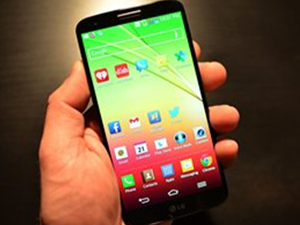



Date:17/02/17
 The latest smartphone figures from Gartner are out, and they paint an extremely familiar picture. Between them, Android and iOS accounted for 99.6 percent of all smartphone sales in the fourth quarter of 2016. This duopoly has been the norm for a while now (in the second quarter of 2015 this figure was 96.8 percent), but it’s always impressive — and slightly terrifying — to see how Google and Apple continue to wring the last decimal point drops of market share from global smartphone users.
The latest smartphone figures from Gartner are out, and they paint an extremely familiar picture. Between them, Android and iOS accounted for 99.6 percent of all smartphone sales in the fourth quarter of 2016. This duopoly has been the norm for a while now (in the second quarter of 2015 this figure was 96.8 percent), but it’s always impressive — and slightly terrifying — to see how Google and Apple continue to wring the last decimal point drops of market share from global smartphone users.
Of the 432 million smartphones sold in the last quarter, 352 million ran Android (81.7 percent) and 77 million ran iOS (17.9 percent), but what happened to the other players? Well, in the same quarter, Windows Phone managed to round up 0.3 percent of the market, while BlackBerry was reduced to a rounding error. The once-great firm sold just over 200,000 units, amounting to 0.0 percent market share.
It’s worth noting that although, in retrospect, this state of affairs seems inescapable, for years analysts were predicting otherwise. Three years ago, Gartner said that Microsoft’s mobile OS would overtake iOS for market share in 2017, while BlackBerry would still be hanging around as sizable (if small) player.
In this latest report, Gartner doesn’t make any future predictions, but notes that the smartphone market continues to shift. In the last quarter it grew 7 percent to 432 million units sold; Samsung’s sales fell for the second consecutive quarter, dropping 2.9 percent year on year; and the middle ground continues to be fought over by a number of successful Chinese brands (including Huawei, Oppo, and BBK). That’s just vendors jostling for position, though, and with Google and Apple’s supremely dominant market share, no one is predicting the rise of a new mobile OS for the foreseeable future.
99.6 percent of new smartphones run Android or iOS
 The latest smartphone figures from Gartner are out, and they paint an extremely familiar picture. Between them, Android and iOS accounted for 99.6 percent of all smartphone sales in the fourth quarter of 2016. This duopoly has been the norm for a while now (in the second quarter of 2015 this figure was 96.8 percent), but it’s always impressive — and slightly terrifying — to see how Google and Apple continue to wring the last decimal point drops of market share from global smartphone users.
The latest smartphone figures from Gartner are out, and they paint an extremely familiar picture. Between them, Android and iOS accounted for 99.6 percent of all smartphone sales in the fourth quarter of 2016. This duopoly has been the norm for a while now (in the second quarter of 2015 this figure was 96.8 percent), but it’s always impressive — and slightly terrifying — to see how Google and Apple continue to wring the last decimal point drops of market share from global smartphone users.Of the 432 million smartphones sold in the last quarter, 352 million ran Android (81.7 percent) and 77 million ran iOS (17.9 percent), but what happened to the other players? Well, in the same quarter, Windows Phone managed to round up 0.3 percent of the market, while BlackBerry was reduced to a rounding error. The once-great firm sold just over 200,000 units, amounting to 0.0 percent market share.
It’s worth noting that although, in retrospect, this state of affairs seems inescapable, for years analysts were predicting otherwise. Three years ago, Gartner said that Microsoft’s mobile OS would overtake iOS for market share in 2017, while BlackBerry would still be hanging around as sizable (if small) player.
In this latest report, Gartner doesn’t make any future predictions, but notes that the smartphone market continues to shift. In the last quarter it grew 7 percent to 432 million units sold; Samsung’s sales fell for the second consecutive quarter, dropping 2.9 percent year on year; and the middle ground continues to be fought over by a number of successful Chinese brands (including Huawei, Oppo, and BBK). That’s just vendors jostling for position, though, and with Google and Apple’s supremely dominant market share, no one is predicting the rise of a new mobile OS for the foreseeable future.
Views: 617
©ictnews.az. All rights reserved.Similar news
- Analysis: New Internet rules will spawn battle for "dots"
- Global software market to bounce back in 2011
- Gartner: Top security vendors are losing market share
- UK health firm signs £1.3m deal for new financial management software
- Suspected LulzSec and Anonymous members arrested in UK
- Dutch study possible Iran hacking of government web sites
- Turkish net hijack hits big name websites
- Coverity software testing package ensures search for God Particle stays on track
- Progress Revolution 2011: IT must focus on adaptability
- French Postal Service Implements Cameleon Software
- Microsoft targets $520bn intelligent device market with next version of Windows Embedded
- Increase in Azerbaijani software market hits 25 percent in 2011
- Microsoft shuffles execs to better manage Windows 8, smartphone ops
- Adobe Q4 profit falls 35%
- Worldwide Database and Data Integration Software Market Expected to Grow 11.6% in 2011, According to IDC





















